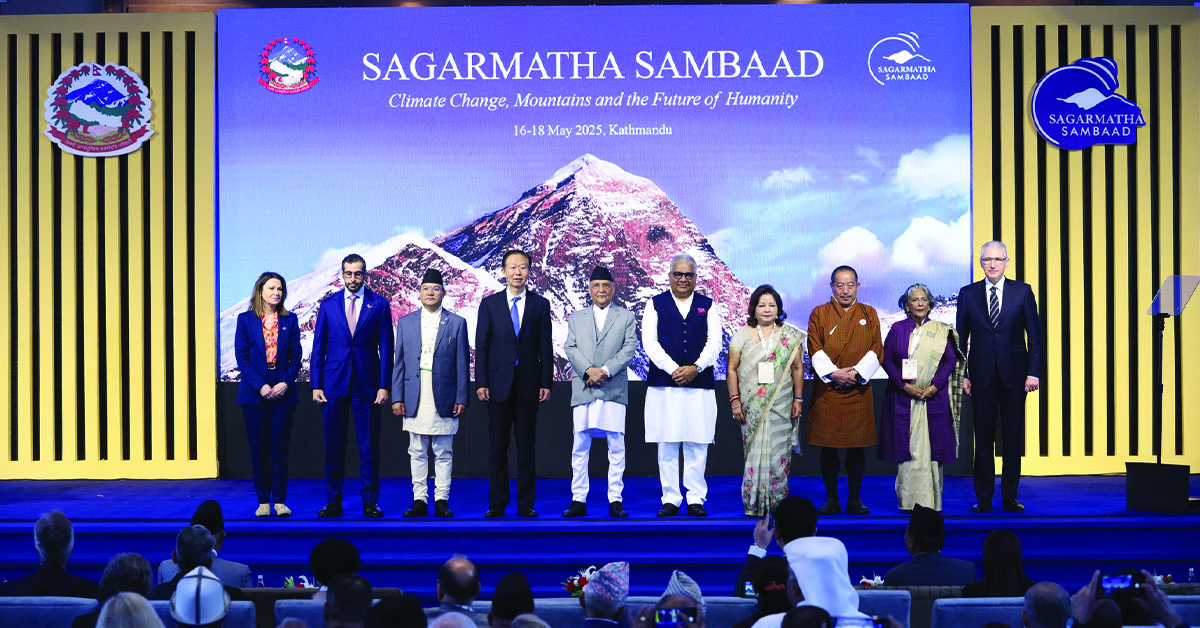
The Sagarmatha Sambaad, held from May 16 to 18 in Kathmandu, has emerged as a prominent dialogue forum to foster Nepal’s soft power on the international stage. With its inaugural theme, “Climate Change, Mountains, and the Future of Humanity,” taking off successfully, the forum highlighted the collective responsibility of all stakeholders to safeguard the planet and secure the future of humankind.
The Sambaad was jointly organised by the Office of the Prime Minister, the Ministry of Foreign Affairs, and the Ministry of Forests and Environment. Among the attendees were 350 high-level dignitaries and participants, including 175 international delegates. The participants, over the course of three days, held discussions and exchanged ideas across 12 thematic sessions.
As a nation situated between the two geopolitical giants — India and China — Nepal seeks to leverage forums like the Sagarmaatha Sambaad to amplify its voice in the global arena, asserting its soft power to complement her economic and strategic ambitions. During the opening session of the Sambaad, Prime Minister KP Sharma Oli underscored the significance of dialogue to address the challenges facing the world. He also stressed the vital role of mountain ecosystems and the need to preserve it in sustaining the Earth’s environment and humanity. On the occasion, the PM also officially launched the Government’s Nationally Determined Contributions 3.0 and handed it over to the COP-29 President Mukhatar Baybayev.
Minister for Foreign Affairs Dr. Arzu Rana Deuba briefed that the Sambaad is a global platform for discussion and deliberation on pressing issues facing humanity. She emphasized that those least responsible for climate change often suffer its harshest consequences, and hence, called for urgent and collective global action for a just and sustainable future.
The forum also featured remarks from key dignitaries including Mukhtar Babayev, COP-29 Presidency Representative of the President of Azerbaijan on Climate Issues; Shri Bhupender Yadav, Minister of Environment, Forest and Climate Change of the Government of India; and Xiao Jie, Vice Chairman of the Standing Committee of the 14th National People’s Congress (NPC), China. The speakers highlighted various aspects of the climate crisis and potential collaborative solutions.
In a video message, United Nations Secretary General Antonio Guterres urged the world to act without delay to take immediate action to keep global warming below 1.5°C, stressing that the world’s biggest emitters must lead the way.
Erik Solheim of Norway, a green politician, noted that Nepal holds a central role in the global fight against climate change. “This forum was a huge opportunity to better understand the role of the Himalayas in the global ecosystem. We could explore pathways for Nepal’s green growth—through hydropower, solar energy, eco-tourism, sustainable agriculture, and forest preservation backed by carbon markets,” he said. Solheim also highlighted that the Himalayas, often referred to as the “Third Pole”, hold the largest volume of glaciers outside the North and South Poles (the Arctic and Antarctic). These glaciers feed major rivers such as the Ganges, Indus, Mekong, and Yangtze—lifelines for nearly two billion people.
A major highlight of the event was a mountain flight of dignitaries and delegates to the Himalayas, including the Mt. Sagarmatha area, to observe our receding glaciers, expanding glacier lakes, and bare mountains as reminders of the climate crisis, and the need to take immediate action.
In his closing statement, Foreign Secretary Amrit Kumar Rai remarked that Nepal had succeeded in bringing together a diverse spectrum of voices – from the highlands to the islands, from mountain communities to coastal nations, from policymakers to scientists, youth, civil society, and indigenous leaders. “And what we witnessed was extraordinary: a convergence of knowledge, empathy and commitment,” he concluded.